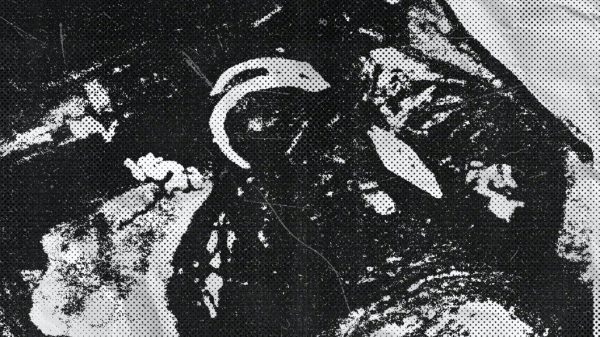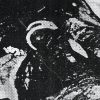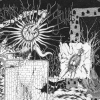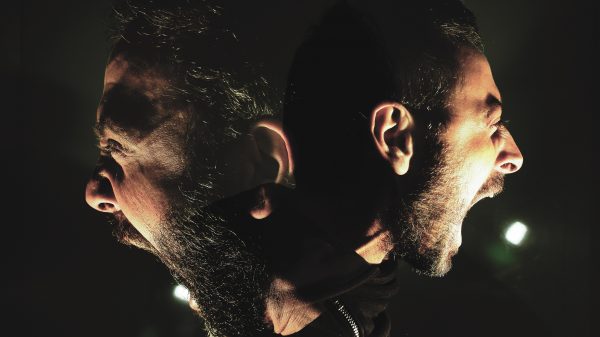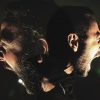When you play in a band called The Ocean, it can’t really be that much of a surprise when you decide to do a concept album on the planet’s waters. It’s an idea that has been festering inside the mind of guitarist Robin Staps for a few years now as he witnessed the band he founded and continues to helm shift between various line-ups and turmoil but nevertheless; he has conceived Pelagial at long last.
Broadly speaking, the album begins with exploring the surface of the waters and descends further into the different pelagic zones of the ocean, of which there are a number of distinct areas starting at the top and slowly working our way down – Epipelagic, Mesopelagic, Bathyalpelagic, Abyssopelagic, Hadopelagic, Demersal and Benthic, the dark and dreary bottom.
“I’ve been having this idea for quite a while actually, since 2008 at the latest. It always seemed like a great challenge to tackle, to do an album that’s a progression from the surface to the abysses of the deep sea and an album that picks up on that in a musical way,” says the guitarist and leader of The Ocean. “It’s not some detached concept, you can really experience that while listening to the music, that you’re going down, that basically you’re progressing toward the hadopelagic zones where the pressure is much higher than at the surface level, where everything is getting really dark, there’s little life.
“I really wanted to make an album where you can feel that, where you don’t have to know much about pelagial depth zones from a scientific point of view but where you can actually feel from the music what’s happening,” Robin says. “I studied geography and I’ve always had a strong interest in marine sciences and marine biology,” he continues, explaining on the roots of the concept and the research involved.
“I didn’t want it to become a scientific album or I didn’t want only people that are kind of like nerds in the field to understand what we are doing so I specifically decided not to gather too much knowledge beforehand in order to not make it too complicated for people. The ocean has played an important part of my life since my early childhood so naturally I’ve read a lot about oceanic matters and was aware of this differentiation of the water columns into five different depth zones for a long time. I just felt that it would be a great challenge to try and translate that into music somehow,” expounds Robin on crafting an album that on first glance appears rather academic but is wholly personal and introspective.
“I’ve just always been a bit shy with approaching it because it seemed really difficult to write music that is basically like a continuous piece of music that’s 60 minutes long so that’s why I recorded Heliocentric and Anthropocentric before I really decided to devote myself to this pelagic project that has been cooking in the back of my mind for quite a few years.”
In more ways than one Pelagial marks a change for Staps and his conceptual designs. In 2010, The Ocean released a duo of concept records, Heliocentric and Anthropocentric, both forming an in-depth critique of modern religions’ roots and problems. Needless to say it was a lofty undertaking involving much research and time commitment. With Pelagial, there weren’t quite the same pressures, says Robin, explaining that “it was just a different challenge”.
He explains on the lack of critique: “I’ve done that with the Centrics, this album is different in that it is very personal. It’s very introvert somehow and directly relating to experiences I’ve had in the past few months of my life. Of course there are, lyrically, broader themes behind it. Like I said, it’s a psychological, inward journey as well as starting at the surface and progressing toward the abysses of the human mind and so there is a lot to be found in there, a lot of modern psychology that you can find but the bottom line is that it is a very personal album and there is not critical message in the lyrics of this album.”
Saying that it’s a personal journey begs the question of just what in Robin’s life inspired him to write this album. However he’s not too keen to divulge. “Lyrics are strong when they require a certain sense of abstraction to get them. If I explained every song in detail and explained the relevance to my own life to everyone then that would ruin it for the people listening to it and trying to find relevance for their own lives,” he clarifies. “I think most of the lyrics speak for themselves. They talk about experiences that I’ve been going through, they talk about, basically… all about the origins of our wishes and desires and how much influence and impact we have in changing them and that’s the central question that this album is orbiting around. But what’s personal, specifically, in a detailed manner is something that I would like to keep to myself.”
So personal matters aside, when discussing our planet’s vast waters or any part of our earth, one is left reeling with a series of questions about the state of our environment and the damage continuously perpetrated by human beings every day to our natural surroundings and resources, specifically the health of our oceans. So while Pelagial is not a critical record, did these ideas of environmentalism ever seep in?
“No, not really. I specifically decided to keep that out, not because I don’t think it’s important or because I’m not interested in it but I really wanted to do a different album this time. I really did not want to make another philosophical or scientific album that is a critique basically.”
What is important to point out about Pelagial is that there are two versions – instrumental and with vocals. How this circumstance came about is somewhat unfortunate. Singer Loïc Rossetti after spending the guts of two years touring with the band and leaving his vocal chords physically and emotionally ruined on the stage every night found himself at the end of harrowing news from a doctor – stop screaming and singing or lose your voice. For someone that plies their craft with their voice and microphone in hand, it must feel like the world is coming to an end.
 “We didn’t want to record an album with great vocals and then not be able to pull it off live. That was part of the motivation to release the album instrumental,” explains Robin. “The other thing was that the album was already shaping up to be very orchestral and very dense and there wasn’t really much space for vocals.”
“We didn’t want to record an album with great vocals and then not be able to pull it off live. That was part of the motivation to release the album instrumental,” explains Robin. “The other thing was that the album was already shaping up to be very orchestral and very dense and there wasn’t really much space for vocals.”
Feeling that the music worked well on its own, with its vast design, Robin proceeded to craft his instrumental album. However after taking a break from touring, Loïc returned to the fold feeling confident and healthy in his voice once again and the band were happy to welcome him back – “His voice is very particular, very special and it’s really shaped the sound of this band over the course of the past three albums,” says Robin. “So I really wanted to have him on the album and he came to the same conclusion. His voice got better and said I really want to keep doing this, so we started recording vocals.”
Initially deciding to only record vocals for two songs on Pelagial, the vocal recording process soon found itself flourishing where every song ended up with vocals. But if the album was conceived as an instrumental record, where did these lyrics come from and how do they espouse the subject matter?
One browse through the album’s liner notes reveals some beautifully crafted poetry and abstract ideas in each stanza. The most poignant of which is ‘Abyssopelagic II: Signals of Anxiety’, which makes reference to a woman standing by the sea and communicating the message “you’ll understand later” to the listener. This serene imagery provides the beginning of some insight into the lyrical workings of Pelagial.
“The lyrics to this album are all making reference to a movie called Stalker by Andrei Tarkovsky,” reveals Robin. “As a matter fact, originally I wanted to use the English subtitles of that Russian movie [as] the lyrics to the entire album, that’s how we started approaching it. Then we realised we couldn’t do that for legal reasons and had to step away from that but there are still a lot of hidden, or not so hidden, references to that movie and that is actually a part that is referring to the movie.”
He continues: “[Stalker] is basically a journey through zones as well, with three protagonists journeying through a zone at which point the protagonists’ wishes are supposed to come true once they enter a room.”
The parallels between the 1979 film’s plot and the pelagic zone are immediately evident and the concept of wishes and desires adds a whole new human and emotional layer to Pelagial. “The closer they get and the more they discuss among themselves what they should wish for, the less they find out they actually know about what they want,” says Robin, “and the more insecure they become, the more they realise that not only will their conscious wishes come true but also all the subconscious wishes, the ones they do not wish to have.”
This is where that affecting line of “you’ll understand later” begins running into the concept, believing we know what we want only for the age old adage of “be careful what you wish for” starting to ring true, and harrowingly so.
Perhaps you could call it luck but the stars aligned for Pelagial to come together, forming this gloriously expansive doubled edged affair but one must ask if Loïc’s vocal health is holding up now?
“He’s all right. We just finished a tour with Cult of Luna in Europe and he’s been singing every show, although he sometimes takes a break in the middle of the set to rest his vocal chords,” he says. This may seem like a disadvantage to the band’s intense live shows but it allows The Ocean to express more of their dynamism by exploring their instrumental works on stage.
“The good thing now is that we’re in a position where we can do anything. We can play the entire album instrumental or with vocals or anything in between. We can decide to play certain track as instrumental or other tracks with vocals so that allows us to do pretty much everything.
“The Centric albums are very much vocal oriented, if you leave out the vocals a lot is missing. I think it’s different from this album because it wasn’t written originally to have any vocals in the first place, although I do think that the vocals are very important now and do add another quality to it or level somehow but these songs also work without vocals. That’s why we’re in a comfortable position where we do whatever suits.”
The band isn’t exactly a stranger to line-up shuffles though and perhaps that’s why Robin can adapt so quickly. He has witnessed many musicians file in and out of The Ocean’s door, most recently bassist Louis Jucker left, without incident, to pursue his studies of architecture and the band were introduced to Chris Breuer, who now mans the four strings. Regardless of this latest change up, The Ocean have been enjoying some stability in recent years.
“I’m very happy with this line-up, the players have been the people I’ve been looking for, for years, and that’s great to be able to play with those people,” says Robin before a pause. “That said, I’m not going to commit to saying that this is going to be the only line-up that the band will ever have. I understand that priorities change in people’s lives, people wanting to have careers, jobs and families and take a step back from touring and that may happen again anytime to any of us,” he says with their bass player switch in mind.
Just look back to 2007’s Precambrian record for the clues that The Ocean always look for new, fresh blood to add to the creative process. The album’s credits include myriad musicians going into double figures and it shouldn’t come as a surprise that something similar could be on the cards in the future. At this moment in time though, the band’s founder is content – “I’m very happy with this line-up right now, it’s the best line-up that this band has ever had.”
This line-up will now traverse across North America on this year’s Summer Slaughter and from there the band will delve into terrain rarely trekked, returning to China, Taiwan and Siberia before planning out a headlining European tour.
“When I started this band, I really wanted to travel and take this band around the world, regardless of money, playing shows always seemed more attractive to me, like playing a South American squat show instead of an open air show, to be honest,” concludes Robin. “So I’m very happy that I get to see these places, not just from a tourist’s perspective but from the eyes of a musician.”












